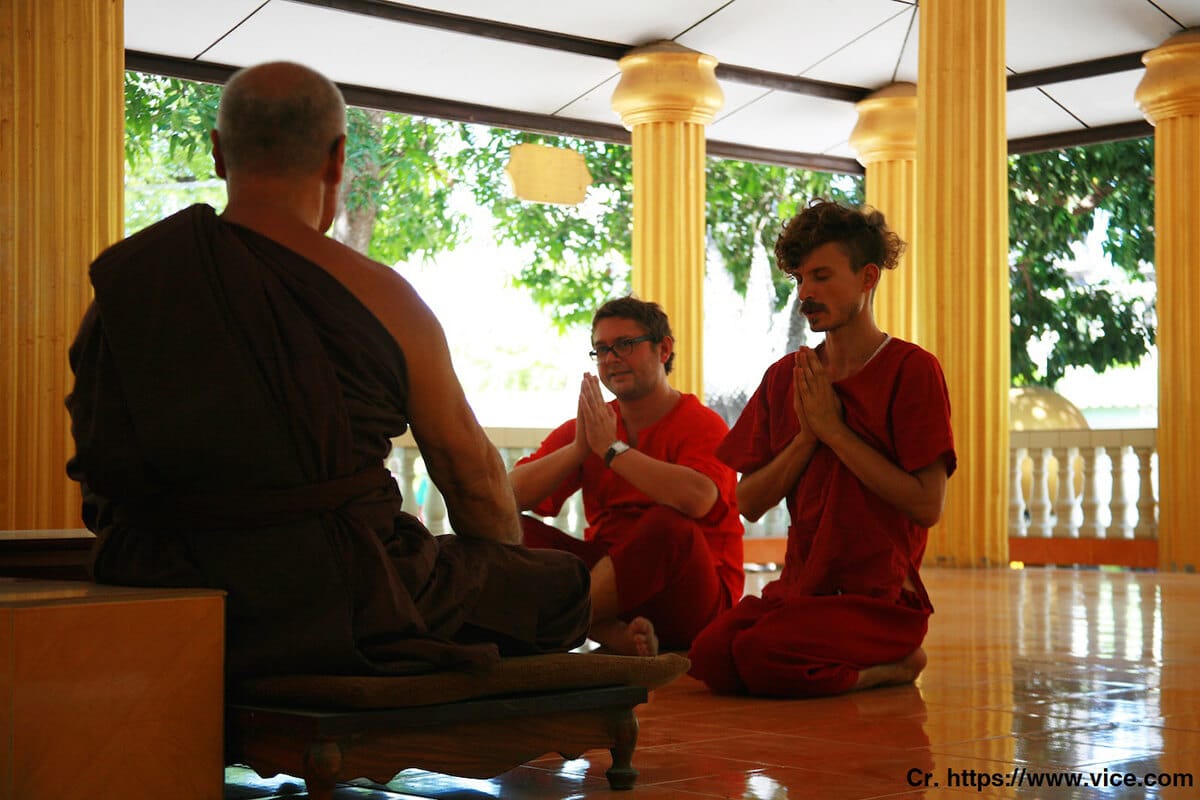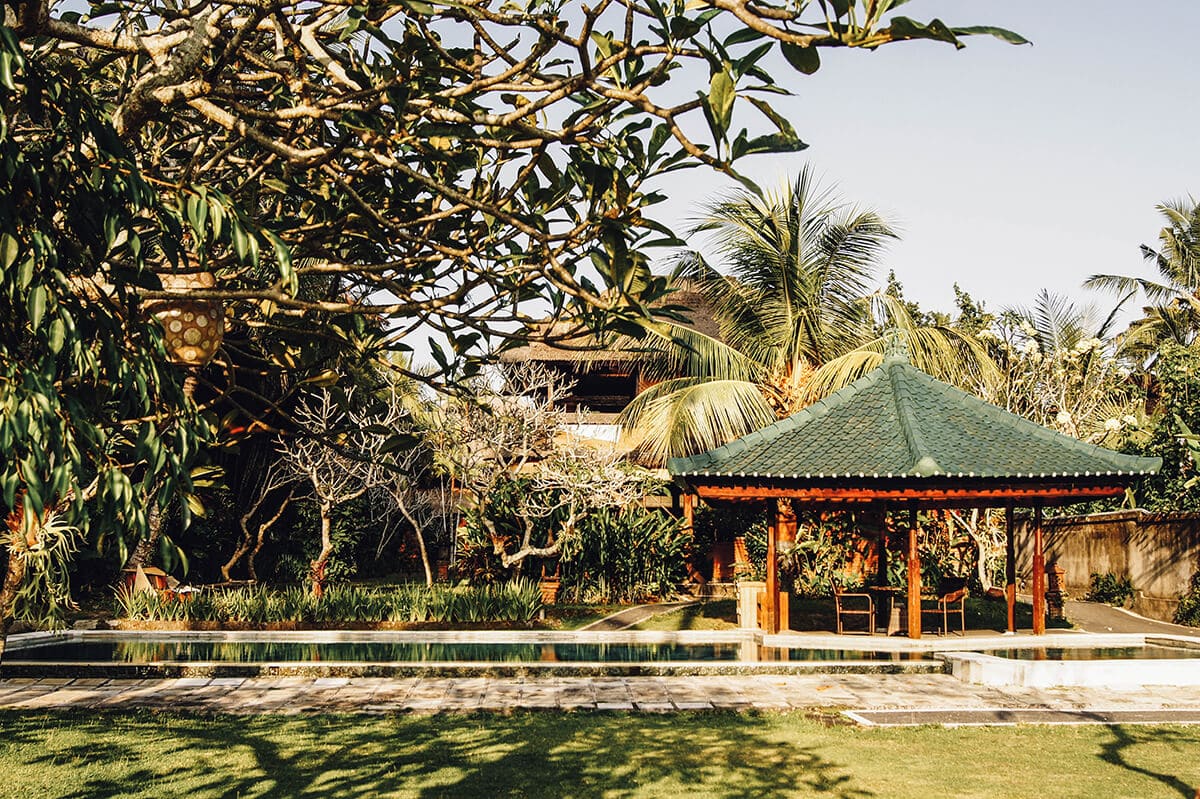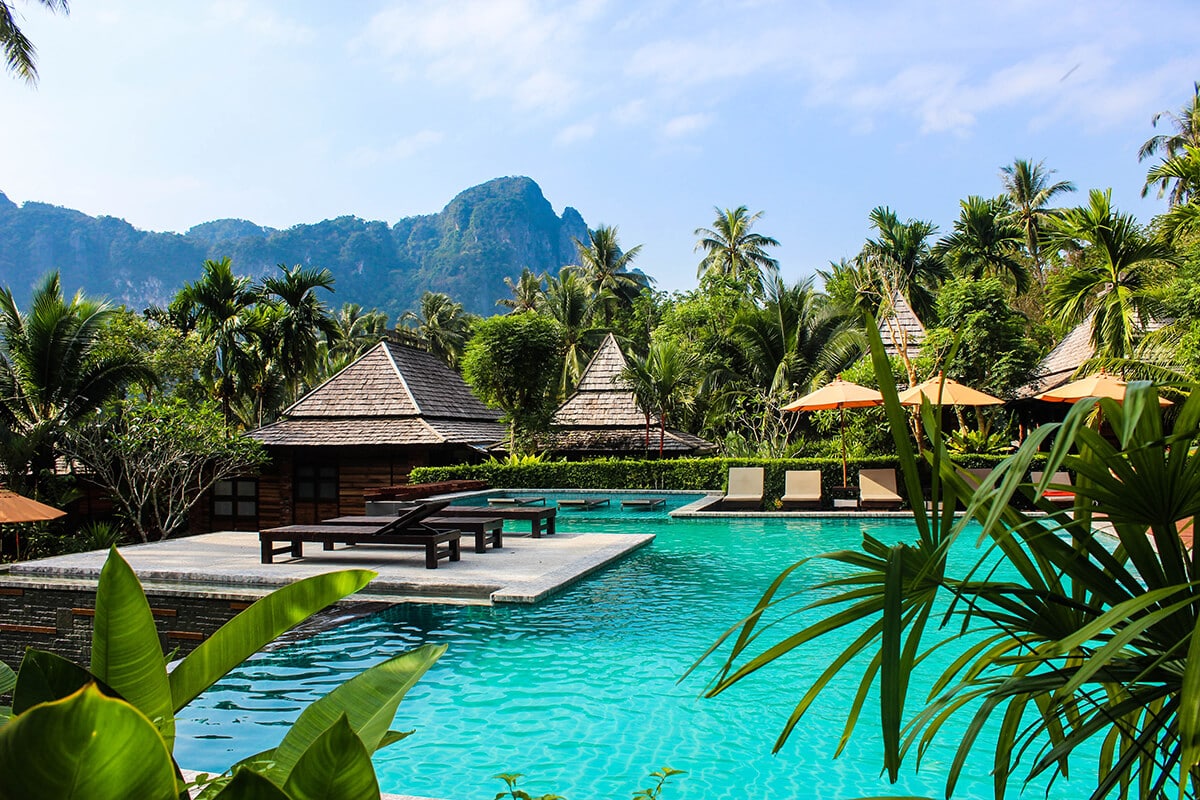Thailand’s reputation as a leading medical tourism hub continues to grow, ranking among the top 5 global destinations for healthcare services. According to the Tourism Authority of Thailand, the country welcomed over 3.07 million medical tourists in 2024, generating significant revenue for its healthcare sector. This sector includes addiction treatment, as Thailand is one of the top rehab destinations in the world — drawing patients from Australia, Europe, North America, and increasingly the Middle East. Most seeking to escape triggers in their home environment, while others value the privacy and anonymity of receiving treatment abroad.
What truly distinguishes Thailand rehab centres is their unique combination of world-class treatment facilities, experienced international professionals, and cost-effective care— Thailand is, in fact, the only country in Asia-Pacific to boast a CARF– international addiction treatment centre (Commission on Accreditation of Rehabilitation Facilities) representing the gold standard in global rehabilitation accreditation, the same certification held by top-tier US treatment centres like Hazelden Betty Ford and The Meadows.
Rehabs in Thailand offer addiction and mental health treatment to people from every walk of life – and at 1/2 of the cost of rehab centres in the West. Many former addicts attribute much of their success to extended stays in a Thailand rehab centre, and the industry is growing quickly. Thailand’s rehab options range from zero-frills vomit temples to world-class facilities with treatment standards on par with the very best rehabs abroad around the world.
Which Is the Best Rehab in Thailand?
When seeking rehab in Thailand, overseas clients can choose between four main types of rehab centres – Buddhist rehab temples, budget rehab centres, holistic rehab centres, and sober living programmes. Each offers distinct approaches to treatment, but their quality and effectiveness can vary considerably.
When selecting a rehab in Thailand, safety should be your primary concern. Many clients enter treatment at their most vulnerable or emotionally unstable state, making a secure, professionally managed environment essential. Qualified clinical and medical staff, proper emergency protocols, and constant supervision provide the foundation for effective recovery during these critical moments.
All legitimate rehabs in Thailand must be licensed by Thailand’s Ministry of Public Health, which ensures they meet local operational standards.
Buddhist Rehab Temples

Buddhist rehab temples, such as Wat Thamkrabok and Wat Mai Siap offer extreme treatment programmes and the approach is the same for everyone. Fees are often voluntary donations, making them the cheapest option of all. Thai rehab temples such as these follow ancient Buddhist principles of purification and mindfulness, believing that addiction recovery requires both physical and spiritual cleansing.
Fees are often voluntary donations.
The treatment protocols include:
- Traditional herbal detoxification using a bitter, vomit-inducing brown liquid, carefully concocted from a closely guarded recipe by the master herbalist
- Intensive meditation practices
- Buddhist teachings and dharma sessions
- Strict daily routines beginning at dawn
- Community work and temple maintenance
- Limited access to technology and the internet
Clients also take a sacred vow of abstinence. No 12 Steps, no harm reduction. The vow is your 100% commitment to complete renunciation of drugs and alcohol from that day forward. The rest of the programme is chanting, silent meditation, herbal saunas, and simple chores. In return, clients are supposedly rewarded with stronger willpower to succeed.
It is worth noting that temple-based rehab programmes vary considerably in quality and safety standards. Unlike regulated medical facilities, these spiritual centres operate without formal oversight, sometimes leading to practices that may not align with modern health and safety protocols. Visitors should research thoroughly, ideally speaking with former participants, and consider their personal health limitations before committing to these programmes. Language barriers can also present challenges in communicating health concerns or understanding treatment procedures.
Pros of Buddhist Rehab Temples:
- The cheapest rehab option in Thailand
- A spiritual approach to rehab
- It can be a life-changing experience
Cons of Buddhist Rehab Temples:
- Dangerous "cold turkey" detoxification practices with no emergency medical protocols that can cause seizures, delirium tremens, heart failure, or death
- No professional counselling or therapy
- Significant cultural and language barriers
- Physically demanding environment with basic living accommodation
- No formal aftercare programme
Who Should Consider Buddhist Rehab Temples?
This treatment option may be suitable for:
- Individuals who have tried conventional rehab without success
- Individuals dependent on substances that do not require medically-assisted detox
- Those seeking a spiritual dimension to their recovery
- People comfortable with austere living conditions
- Individuals who can manage potential language barriers
Budget Rehab Centres

Budget rehabs in Thailand offer drug and alcohol addiction programmes in a supportive environment where shared or private accommodation is comfortable, and the treatment focus is on the essentials of addiction recovery. These facilities typically hold only local accreditation from Thailand’s Ministry of Public Health, which sets minimum operational standards but falls short of many of the criteria needed for international certification.
Monthly rates at these budget rehabs in Thailand range from $3,000 to $8,000 USD.
But what exactly does this lower price point get you? Budget rehab centres in Thailand are typically modest, privately-run facilities that have proliferated across the country in recent years. Many are established by Western counsellors in recovery who previously worked at the more established holistic treatment centres, bringing elements of those approaches but implementing them with fewer resources.
These centres adhere to minimum operational standards to keep costs manageable, providing essential addiction treatment services at accessible price points for those with limited resources. Their treatment philosophy often centres heavily on the 12 Step model and group therapy, supplemented with holistic elements like massage, physical fitness, and art therapy.
Staff members frequently wear multiple hats – your counsellor might also serve as your fitness instructor in the morning and your support person during evening activities. While this integrated approach creates a family-like atmosphere, it often means these professionals have training primarily in addiction recovery, with many being recovering addicts themselves. This peer-based model offers the advantage of shared experience but lacks the specialised clinical expertise needed for complex cases or dual diagnoses. Prospective clients should carefully evaluate whether such facilities can adequately address their specific needs, particularly if they require psychological or psychiatric care alongside addiction treatment.
If you require detox as part of your treatment, ensure you enquire about the specific details of how it will be managed—even if the website claims to offer onsite detox. It’s crucial to confirm whether they have registered nurses to monitor you round the clock, who prescribes the medication, and what emergency protocols are in place. Many budget facilities lack the medical infrastructure for safe detoxification, which can be potentially dangerous during withdrawal. Having properly trained medical staff for detox support is essential to help you through this physically challenging phase and safely transition to the psychological aspects of recovery.
Pros of Budget Rehab Centres:
- Affordable pricing
- Laid back environment
- Treatment methods are combined with cultural excursions
Cons of Budget Rehab Centres:
- Limited or unsafe detox facilities lacking proper medical supervision (potentially life-threatening especially in managing severe withdrawal symptoms)
- A group-based traditional 12 Step approach to rehab vs individualised treatment - Less comprehensive mental health support
- Higher staff-to-client ratios
- Lack of privacy due to shared living spaces
Who Should Consider a Budget Rehab Centre?
Budget rehabs are particularly well-suited for individuals with primary substance use disorders who do not require intensive mental health support or medically-assisted detox. These centres work best for clients who are comfortable being with large groups staying at facilities with modest amenities and are primarily focused on just starting their sobriety. The treatment effectiveness often depends on clients’ will and commitment.
These centres frequently achieve positive outcomes in:
- Establishing initial sobriety
- Developing basic coping skills
- Building peer support networks
Holistic Rehab Centres

In Thailand’s rapidly expanding wellness industry, truly high-quality holistic rehab centres that meet international standards remain exceptionally rare — in fact, across the entire Asia-Pacific region, The Dawn stands alone with CARF accreditation, the same prestigious certification held by renowned Western facilities like Passages Malibu and Cottonwood Tucson.
Holistic rehab centres in Thailand have emerged as leaders in comprehensive care. There are less than a handful of these types of centres and they are located in Chiang Mai. These facilities go beyond traditional addiction treatment, addressing both substance use disorders and mental health conditions through an integrated approach that combines advanced Western therapeutic practices with Eastern healing wisdom.
Monthly rates at holistic rehab centres in Thailand range from $10,000 to $20,000 USD.
Unlike budget rehabs that take a traditional 12 Step or group treatment approach, holistic treatment centres employ a more individualised treatment approach – creating customised recovery plans tailored to each client’s specific needs, history, and goals rather than applying a one-size-fits-all method.
This personalised approach utilises multidisciplinary teams of professionals, including psychiatrists, psychologists, and trained therapists. This diverse expertise allows them to effectively treat co-occurring disorders, recognising that addiction often intertwines with underlying mental health conditions such as trauma, PTSD, anxiety, and depression. For instance, The Dawn Wellness Centre and Rehab is renowned for pioneering its own person-centred treatment method as well as a specialised trauma programme to address these specific issues at their root cause. The Dawn’s mental health treatment approach attracts a significant number of clients suffering just from solely mental health issues alone.
A critical component of these holistic centres is their professional onsite detox services. The importance of proper medically supervised detox cannot be overstated, as managing withdrawal symptoms can be quite severe and, if not handled properly, fatal. This medical oversight ensures clients can safely begin their recovery journey under professional care.
What is also a plus is how some facilities are equipped with advanced treatment technology such as Transcranial Magnetic Stimulation (TMS) to help particularly with depression, which is often linked to Alcohol Use Disorder (AUD). This cutting-edge therapy complements other treatment approaches and can significantly improve outcomes.
Yet, despite these centres’ heavy investment in high-quality treatment services and more sophisticated treatment options, drug rehab Thailand prices are 50% cheaper than similar standard centres in the West due to the overall lower cost of living in South East Asia.
Accommodation standards are notably enhanced at these facilities, particularly in premium centres like The Dawn. Clients enjoy resort-like environments with beautifully landscaped grounds, swimming pools, fitness centres, and meditation spaces—all thoughtfully designed to promote healing and wellbeing.
Pros of Holistic Rehab Centres:
- Personalised treatment approach with tailored treatment plans
- Professional onsite detox + 24/7 onsite medical support
- Multi-disciplinary treatment teams of licensed clinical and medical staff
- Some centres offer dedicated programmes solely for mental health conditions, separate from addiction treatment
- Rigorous quality assurance through annual accreditation audits
- Lower costs compared to similar Western facilities
- Premium accommodation with extensive wellness amenities
- Comprehensive continuing care services including aftercare and step down programmes for sustained recovery
Cons of Holistic Rehab Centres:
- The most expensive option in Thailand
Who Should Consider a Holistic Rehab Centre?
Holistic rehab centres, like The Dawn, represent the optimal choice for clients seeking immersive addiction treatment in tranquil surroundings. These facilities offer a complete recovery journey—from medically supervised detoxification through to structured aftercare programmes—creating a continuous path to lasting wellness. By addressing both addiction and underlying mental health conditions simultaneously, they significantly reduce the likelihood of relapse and repeated treatment cycles.
For those viewing recovery as a vital investment in their long-term wellbeing rather than a temporary solution, these centres provide the multidisciplinary expertise and supportive environment necessary for sustainable transformation.
Sober Living Houses

Commonly known as halfway houses, experts regard sober living houses (SLHs) as the next step after rehab programmes and an essential element of successful addiction recovery. This transition period is often the most vulnerable time in recovery, which is why many leading treatment centres, including The Dawn Rehab Thailand, offer a structured Step Down Programme designed to provide a supportive environment while clients live on-site but have the freedom to come and go, allowing for real-world practice of recovery skills.
Monthly rates for sober living houses or halfway houses in Thailand start at $1,000 to $6000 USD.
SLHs cultivate balanced living in a safe, supported environment. It is a time to find new interests and revive old dreams. Residents go to therapy, volunteer, meditate, or try out new things like learn Thai, Muay Thai boxing, or Thai cooking classes.
Pros of Sober Living Houses:
- Guidance and support on one’s road to recovery
- Help mitigate the risk of relapse
- Easier transition back to one’s normal life
- New, meaningful relationships with fellow clients
Cons of Sober Living Houses:
- Best utilised after completing primary treatment
- Requires commitment to house rules and community living
- Should have a clear plan for eventual transition
Who Should Consider a Sober Living Houses?
Sober living homes are ideal for recovering addicts who have already received primary treatment and just need help and support during their transition back to everyday life. This mitigates the risk of relapse. Its success often lies in its ability to provide a balanced approach to recovery – offering enough structure to maintain sobriety while allowing the flexibility to build a fulfilling, independent life.
Why Choose a Residential Rehab?
A residential rehab typically requires a commitment of both time and money, which may raise questions about whether it’s worth it. Beyond just getting sober, it helps you take back control of your life from addiction. Because it is a chronic, progressive disease, choosing a residential rehab is always in the best interest of your long-term physical and mental health. The results speak for themselves: 85-95% of people who complete a treatment programme report staying sober nine months after finishing. An inpatient rehab provides the structure and support needed to break free from addiction and rebuild a life where you—not substances—make the decisions. In this safe environment, away from triggers—the people, places, and situations that fuel your using—you can focus solely on your recovery journey. This protected space allows you to concentrate on healing without the distractions and pressures of everyday life.
However, recovery isn’t always a straight path forward. While relapses can be both disappointing and frightening, they are a relatively common part of the healing process, with estimates suggesting 40-60% of people experience at least one during their recovery. Treatment programmes will equip you with essential skills to recognise warning signs, develop prevention strategies, and create an action plan for managing potential difficulties along the way. Better quality centres will have continuing care mechanisms in place to support clients once they leave – such as aftercare and alumni programmes – providing ongoing guidance during this vulnerable transition period.
When you decide to go to a residential rehab, you also choose to give yourself the gift of a concentrated, structured period of time to detox, learn about your addiction, understand its root causes, and acquire tools to manage it. Three months of rehab is generally considered to be the minimum time needed for treatment to be successful, with longer stints being useful in giving the person more time to practice new skills and further develop thoughts and behaviour outside of the cycle of addiction.

What are the benefits of going to rehab in Thailand?
The main reason is definitely the wide range of various rehab centres. As we have already covered, you can choose from Buddhist rehab temples, budget rehab centres, holistic rehab facilities, and sober living homes. That provides overseas clients with flexibility regarding how they want to approach their treatment.
Other reasons why international clients seek help in rehabs in Thailand include:
- Lower rehab costs. Thai rehab centres provide the same, if not better, quality of treatment for 1/2 the amount you would have to pay for rehab when comparing them to similar standard centres in the West, due to Thailand’s lower cost of living.
- Complete removal from triggers. Rehabs abroad provide clients with protection from everyday triggers, allowing them to focus on their recovery in more peaceful surroundings.
- Protection of one’s privacy. By travelling to Thailand for rehab, you can put distance between you and your normal environment. This way, you can focus on your treatment and recovery without worrying it might affect your social status and career.
- Chance to receive a longer-term treatment. Thanks to the lower costs of rehab in Thailand, clients can extend their treatment period and take advantage of recovery programmes to enhance their chances of full recovery.
When should I go to a rehab in Thailand?
Many people struggling with addiction treat going to rehab as a last resort. They either insist they do not have any problem or believe they can battle it themselves. This approach can only lead to more severe consequences.
The sad reality of treating addiction is that seeking professional help is not just another option – it’s a necessity. And when it comes to treating addiction, the sooner you react, the higher your chances of recovery.
As said, finding a rehab centre in Thailand is the best option, offering you better value for money, privacy, and access to the best addiction professionals. The question is when to seek their help. If you suspect you or your loved one may benefit from going to rehab in Thailand, pay attention to the following signs:
- Your addiction starts interfering with your social and professional life
- You put yourself in dangerous situations under the influence or to satisfy your addiction cravings
- You can’t quit despite trying
- You experience severe withdrawal symptoms, such as headaches, shivers, or cold sweats
- You feel strong, constant cravings during withdrawal periods
- You experience frequent mood swings
Of course, these symptoms heavily depend on one’s addiction. Nevertheless, if you start noticing you or your loved one shows signs of potential addiction, it’s vital to act immediately.
How do I find the best rehab in Thailand?
If you decide to go to rehab in Thailand, you need to find the best facility to suit your rehab needs. Although you have multiple options here, not all may suit your specific requirements. The best idea is to consider the following factors:
- Addiction treatment options. Does the rehab centre specialise in treating your addiction? If not, look elsewhere. For example, The Dawn’s treatment programmes include behavioural addiction treatment, alcohol addiction treatment, and drug addiction treatment in Thailand.
- Your budget. One of the most significant advantages of Thai rehab centres is their lower costs. But as mentioned, various types of rehab facilities offer different pricing. If you do not have the budget to undergo holistic treatment, a Buddhist or budget rehab centre may be a better option if you are willing to sacrifice the quality of personalised treatment services.
- Accommodation & amenities. If you value convenience, seeking a rehab centre with upscale facilities offers an unbelievable experience. The Dawn, for instance, is a resort-style facility with a plethora of amenities, such as meditation rooms, a gym, a swimming pool, and a dedicated fitness and wellness studio.
Besides these key factors, you should also think about licensing and staff qualifications. That’s not something you initially think about when selecting a rehab centre, but these have a significant impact on your treatment’s results.
How do I apply for rehab in Thailand?
Once you find the best Thai rehab centre that suits your needs, the next step is to apply for it. Fortunately, applying for rehab in Thailand is straightforward and should not take more than a few days. That is, of course, the case for The Dawn.
Our admission process is straightforward, transparent, and convenient. We ensure our future clients receive immediate help. Here’s what our application process looks like:
- Initial contact. Everything begins with a potential client or their family contacting The Dawn’s staff via email or phone. We then assess their details and history, as well as provide you with an overview of how our rehab centre works.
- Follow-up call. After the first contact, one of our clinical staff contacts the client to perform a clinical assessment of their medical history and mental health.
- Payment. Once the client’s mental health and medical history are assessed, the client then pays an initial deposit to secure their accommodation and space on their treatment programme.
- Travelling to Thailand. With everything ready, we help our clients arrange their trip to Thailand, including booking the flight, visa support, and airport transfers.
Once you arrive at our holistic rehab centre in Chiang Mai, we will perform a comprehensive medical check-up and lead you to a medically supervised detox, if needed. From there, you will proceed with your personalised treatment programme that embodies our commitment to excellence in addiction treatment.
Looking for the Best Drug Rehab in Thailand? Choose The Dawn

The Dawn Wellness Centre and Rehab Thailand is the only internationally accredited holistic rehab centre offering treatment services of the highest quality in a serene riverside setting in Chiang Mai, Thailand having successfully treated over 1,000 clients.
Now with two campuses in Chiang Mai, The Dawn offers clients more pricing options while maintaining our high standards of care. We provide a range of specialised treatment plans to accommodate your unique needs and preferences. Our international team of professionals remains committed to guiding you through every step of your recovery journey.
People Also Ask
Q: How much does rehab cost for 3 months?
A: Thai rehab temple fees are by voluntary donation, making them the cheapest option. Monthly rates at budget rehabs in Thailand range from $3,000 to $8,000 USD. Monthly rates at high quality holistic rehab centres in Thailand range from $10,000 to $20,000 USD. Monthly rates for sober living houses or halfway houses in Thailand range from $1,000 to $6,000 USD
Q: What is the success rate of people who go to rehab?
A: Because addiction is a chronic, progressive disease, the decision to go to rehab will always be a choice made in the best interest of one’s long-term physical and mental health. Rehab helps ensure a successful recovery, with 85-95% of those finishing a treatment programme reporting continued sobriety nine months after the programme ends.
Q: Why do people run away from rehab?
A: There are two common reasons why people leave rehab prematurely: feeling overwhelmed by the process or becoming overconfident in their recovery. It is not unusual for people at some point in their rehab journey to feel that they don’t like their rehab, decide that they don’t need it for their recovery, or to become ambivalent about their successful completion of treatment. These reactions are often related to the challenges of breaking away from old habits and ending the cycle of addiction. At The Dawn, we provide our clients with 24/7 care, decreasing their risk of running away.
Q: How many months does it take to rehab?
A: Three months of rehab is generally considered to be the minimum time needed for treatment to be successful, with longer stints being useful in giving the person more time to practice new skills and further develop thoughts and behaviour outside of the cycle of addiction. However, the exact treatment period depends on each individual case.

